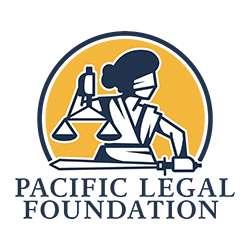The Volokh Conspiracy
Mostly law professors | Sometimes contrarian | Often libertarian | Always independent
Upcoming Pacific Legal Foundation Symposia on Regulatory Takings and the Antiquities Act
PLF seeks submissions by scholars.

The Pacific Legal Foundation, a prominent libertarian-leaning public interest firm is sponsoring two upcoming symposia, and soliciting contributions from legal scholars and other experts. The first is on regulatory takings. Here is the announcement and information on how to submit a proposal:
Pacific Legal Foundation and George Mason University's Journal of Law, Economics & Policy seek papers for a symposium titled "Too Far: Imagining the Future of Regulatory Takings," to be held at George Mason University Antonin Scalia Law School in October 2024.
A century ago, Oliver Wendell Holmes, speaking for the Supreme Court, assured us that "[t]he general rule at least is that while property may be regulated to a certain extent, if regulation goes too far it will be recognized as a taking." In the ensuing one hundred years, courts have struggled to draw the line defining "too far." Some still wonder whether such a line should even exist. As Justice Clarence Thomas recently said, "If there is no such thing as a regulatory taking, we should say so. And if there is, we should make clear when one occurs."
Applicable Research Topics
Pacific Legal Foundation seeks papers that offer fresh ideas on how to make "too far" more just, more concrete, and more principled. We welcome proposals that look at this problem from legal, economic, political, historical, and related angles, including empirical and nonempirical approaches.
Honorarium, Deadlines, and Submission Details
Please submit a brief proposal that describes your thesis and how your paper will contribute to the legal issues described above. Proposals should be submitted by April 15, 2024, to Ethan Blevins at eblevins@pacificlegal.org.
Authors of accepted papers will receive a $2,500 honorarium. In addition, papers will be presented at a symposium in October 2024 and published in a special edition of the Journal of Law, Economics & Policy.
Contact Details
For questions regarding the call for papers, please contact Ethan Blevins at eblevins@pacificlegal.org.
The second is about the Antiquities Act:
The Pacific Legal Foundation seeks papers for a research roundtable on "Answering the Chief Justice's Call on the Antiquities Act" to be held this July at our offices in Arlington, Virginia.
Here is a writeup of the background law, and the following is an excerpt from the call for papers at PLF's website:
In a 2021 statement accompanying the Supreme Court's order denying certiorari in Massachusetts Lobstermen's Association v. Raimondo, Chief Justice John Roberts made an open solicitation for "other and better opportunities" to consider "what standard might guide our review of the President's actions" under the Antiquities Act. The Chief Justice's call to the bar is overdue.
We seek papers that answer Chief Justice Roberts's call.
- We are looking for ideas that get directly to the query posed by Chief Justice Roberts: "What standard might guide [the Court's] review of the President's actions" under the Antiquities Act?
- Between hard-look review and no review, there must be some alternative. We are looking for proposed frameworks to fill this crucial gap in the law.
- Is it possible to give meaning to the Act's "smallest area compatible" requirement without upsetting stare decisis (that is, by overturning Franklin v. Massachusetts and/or Dalton v. Specter)?
- Can a novel standard of review for presidential authority be gleaned from the early-20th-century (pre-Administrative Procedure Act) jurisprudence?
- Do pleading requirements have a role in judicial review of the president's statutory powers, as held by at least one circuit court?
- Is it possible to distill certain of the "hard-look" factors into an appropriate framework for judicial review of the president's statutory powers?
- In setting a standard of review for the president's statutory authority, does it matter that the Antiquities Act is a domestic statute, and the president cannot draw upon any independent Article II authority (as the president is able to do for delegations that implicate foreign policy)?
- Could the Court's major questions or nondelegation doctrines inform a framework for judicial review of the president's statutory powers under the Antiquities Act?
Honorarium, Deadlines, and Submission Details
Please submit a brief research proposal that describes your thesis or research question(s) and intended methodology. Proposals should be submitted by March 25 to Will Yeatman at wyeatman@pacificlegal.org.
Authors of accepted papers will receive a $2,500 honorarium and will further benefit from feedback on their research at the workshop. Papers will be published on the PLF website.
I participated in a previous PLF symposium, and got a lot of useful exposure and feedback for my article "The Constitutional Case Against Exclusionary Zoning" (coauthored with Joshua Braver), which has since been accepted by the Texas Law Review.
NOTE: My wife, Alison Somin, is an attorney at PLF, but is not involved in assessing proposals for either of these symposia. Nor am I myself doing so. Please send proposals to the persons indicated above, not to me.


Show Comments (4)